|
|
|
Sort Order |
|
|
|
Items / Page
|
|
|
|
|
|
|
| Srl | Item |
| 1 |
ID:
074084


|
|
|
|
|
| Publication |
2006.
|
| Summary/Abstract |
Jordan and Syria, severed parts of the same country, were in many ways 'siblings': their systemic situation, as economically weak small states surrounded by more powerful enemies, was similarly vulnerable; their leaders at the time of the Iraq War were of a similar 'modernising' generation; the identities of their populations were similarly Arab-Islamic. Yet, they followed diametrically opposite policies toward the invasion of Iraq: Jordan bandwagoning with the United States and Syria defying it. This contrary behaviour is explained by their differential experiences of state formation and the differing social forces incorporated and identities institutionalised in Ba'thist Syria and Hashemite Jordan.
|
|
|
|
|
|
|
|
|
|
|
|
|
|
|
|
| 2 |
ID:
177602


|
|
|
|
|
| Summary/Abstract |
The English School famously established the existence of an International Society. The first generation of ES scholars (Bull 1995) demonstrated, as against rationalist approaches such as realism, that IS matters for world politics and identified its dominant institutions, with sovereignty often seen as the master institution. Institutional change was chiefly addressed first in ES work on the export of Westphalian sovereignty to the non-Western world (Bull and Watson 1984) and later in debates over the impact of the global diffusion of Western ‘World Society’s’ liberal norms (eg, human rights) on sovereignty-centric IS. Notably, Buzan (2004) and his collaborators argued that, while a ‘thin’ sovereignty-centric IS had been globalized, regions retained distinctive packages of institutions resistant to normative homogenization
|
|
|
|
|
|
|
|
|
|
|
|
|
|
|
|
| 3 |
ID:
159359
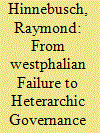

|
|
|
|
|
| Summary/Abstract |
The problematic export of the Westphalian system to MENA is examined, taking Syria as exemplar. The export model is juxtaposed to actual non-lineal trajectories, semi-sovereignty and hybrid or failing states. This is manifested in post-uprising Syria in failing statehood, fragmented and overlapping governance, permeable and collapsing borders, the loss of sovereignty to trans-state movements, “competitive regime-building” between the Asad regime and jihadist warlords, and “competitive interventionism” by external powers filling the governance vacuum with their own proxies. The result is heterarchic zones of limited statehood in which state sovereignty is contested by both international (supra-state) penetration and sub-state fragmentation.
|
|
|
|
|
|
|
|
|
|
|
|
|
|
|
|
| 4 |
ID:
054441
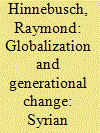

|
|
|
| 5 |
ID:
074565
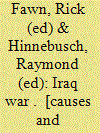

|
|
|
|
|
| Publication |
New Delhi, Viva Books Private Limited, 2007.
|
| Description |
ix, 357p.hbk
|
| Standard Number |
8130904276
|
|
|
|
|
|
|
|
|
|
|
|
Copies: C:1/I:0,R:0,Q:0
Circulation
| Accession# | Call# | Current Location | Status | Policy | Location |
| 051851 | 956.70443/FAW 051851 | Main | On Shelf | General | |
|
|
|
|
| 6 |
ID:
074080
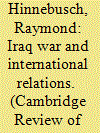

|
|
|
|
|
| Publication |
2006.
|
| Summary/Abstract |
The Iraq War exposes the new shape of world politics. It discredits the idea of a benign hegemon defending world order, content to be an 'offshore balancer', exercising its power through multinational institutions and constrained by mutually agreed rules. Rather, the hegemon, facing few external constraints in a unipolar world, is driven by the particularistic interests of its ruling group, in the pursuit of informal empire wherein military force is used to impose client regimes and economic subordination. The impotence of both a realist power balance and of liberal institutions to restrain it calls into question the main bases of global order, leaving imperial overreach as the main limitation on hegemonic power. Small states may be able to adapt to, even temporarily profit from, bandwagoning with the hegemon, but it is they that are potentially most threatened when a hegemonic power undermines the international constraints on the use of power.
|
|
|
|
|
|
|
|
|
|
|
|
|
|
|
|
| 7 |
ID:
111692
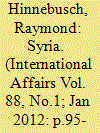

|
|
|
|
|
| Publication |
2012.
|
| Summary/Abstract |
Syria was, until recently, seen as a 'successful' example of authoritarian 'upgrading' or 'modernization;' yet in 2011 the Syrian regime faced revolution from below: what went wrong? Bashar al-Asad inherited a flawed regime yet managed to start the integration of his country into the world capitalist market, without forfeiting the nationalist card by, for instance, attempting to acquire legitimacy from opposition to Israel and the US invasion of Iraq. Yet, despite his expectations and that of most analysts, his regime proved susceptible to the Arab uprising. This article examines the causes and development of the Syrian uprising of 2011. It contextualizes the revolt by showing how the construction of the regime built in vulnerabilities requiring constant 'upgradings' that produced a more durable regime but had long term costs. It focuses on Bashar al-Asad's struggles to 'modernize' authoritarianism by consolidating his own 'reformist' faction, balancing between the regime's nationalist legitimacy and its need for incorporation into the world economy; his shifting of the regime's social base to a new class of crony capitalists; and his effort to manage participatory pressures through limited liberalization and 'divide and rule'. The seeds of the uprising are located in these changes, notably the abandonment of the regime's rural constituency and debilitating of its institutions. Yet, it was Asad's inadequate response to legitimate grievances and excessive repression that turned demands for reform into attempted revolution. The article then analyses the uprising, looking at the contrary social bases and strategies of regime and opposition, and the dynamics by which violence and foreign intervention have escalated, before finishing with comments on the likely prognosis.
|
|
|
|
|
|
|
|
|
|
|
|
|
|
|
|
|
|
|
|
|